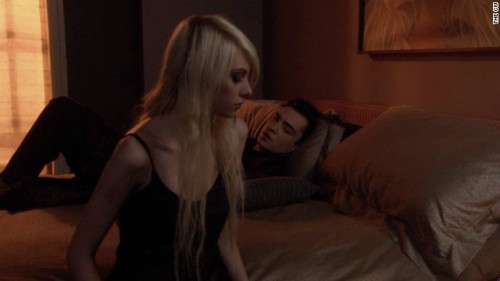This guest post by Scarlett Harris appears as part of our theme week on Rape Revenge Fantasies.
There are multiple rapes that occur in the “scandalous lives of Manhattan’s elite” of Gossip Girl lore. In the pilot episode alone, there are two instances of rape.
Newbie to Upper East Side society, Jenny Humphrey, is sexually assaulted on the rooftop whilst a high school dance takes place below. Her assailant, the reprehensible Chuck Bass, who has wormed his way into the zeitgeist as the ultimate bad boy, had earlier forced himself onto Jenny’s brother Dan’s date, Serena van der Woodsen. Whilst Chuck’s entitlement is highlighted here, the way Gossip Girl later paints him as a wolf in sheep’s clothing sheep in wolf’s clothing worthy of a happy ending with the show’s just-as-culpable heroine, Blair Waldorf, is careless. There are plenty of other ways the consequence-free lifestyle of Serena, Blair, et al. could be portrayed that wouldn’t reward misogyny.
But that seems to be Gossip Girl’s calling card: Chuck later goes on to rape Blair by posing as someone else in the season two episode “The Dark Night.” He cuts her face when he smashes a window in rage. He pimps her out to his uncle for a piece of real estate. Said uncle tries to force himself on his dead brother’s widow, Lily. And, in probably the most blurred (story)line involving sex and consent in the CW series, Jenny, years after her violent debut into Manhattan society, shows up on Chuck’s doorstep, dejected and lonely, and the two find objectionable comfort in each other’s sex organs. Cathryn writes about this more extensively than I ever could here.
Chuck’s (not-so-distant) rapist past serves as a plot point to show how far he’s allegedly come as a reformed bad boy. Jenny’s rape and subsequent ousting from Manhattan at the hands of Blair, however, positions her storyline as a cautionary tale of what gossip, money, and lack of boundaries can turn a person into. Granted, Jenny caused a lot of trouble for her former friends and family, but rape is never a fitting punishment. Her banishment by Blair when she finds out what transpired between Jenny and her on-again, off-again lover is typical of the punish-the-woman mentality Gossip Girl is so fond of. Instead of shaming her partner for taking advantage of a teenage girl, Blair blames Jenny for ruining her proposal. And when Jenny returns the following season to help Chuck take down Blair (keep up, people!), she should really be seeking revenge on her rapist, wouldn’t you say?
So while Jenny is a metaphor for the toxicity of Manhattan society and the good girl gone bad, her fellow Chuck-rape-almost-victim, Serena, is the opposite: the bad girl striving to make amends.
The parallels between the two blondes closest to “the ultimate insider” and *spoiler alert* the man revealed to be Gossip Girl, Dan Humphrey, are apparent in the first few seasons. In the pilot, Serena returns from boarding school after being embroiled too deeply in the debauchery of the Upper East Side as Jenny is just being introduced to it. They are both romantically interested in Chuck’s bestie, Nate Archibald.
By season three the actress who portrays Jenny, Taylor Momsen, was the quintessential bad girl, sporting thick eyeliner and a negligee as outerwear, and fronting a rock band. Think a modern-day Courtney Love. Meanwhile, golden girl Blake Lively (Serena) was covering magazines, starring in The Town and filming Green Lantern, and dating such high-profile men as Leondardo DiCaprio. Gossip Girl mirrored this metatextually by showing Jenny reading a copy of Nylon magazine with Lively on the cover, breaking the fourth wall.
Speaking of art imitating life, season two threw shades of Steubenville. Dan is embroiled in a sex scandal when it’s claimed that he had been sleeping with his teacher. The allegations turned out to be fabricated by Blair, who was then expelled from school and had her acceptance to Yale revoked. Dan’s stepmother, Lily, is sympathetic to Dan’s relationship with Serena being put in jeopardy and his female teacher being branded a sexual predator, but wonders, “Should Blair lose Yale over this? It’s her future.” This is reminiscent of the utmost concern shown to teen Steubenville rapists Trent Mays and Ma’lik Richmond and their bright sporting futures after being found guilty of the crime whilst the welfare of the anonymous victim who’ll be dealing with her assault for the rest of her life went by the wayside.
Whereas Steubenville occurred in real life and the myriad assaults and questionable sexual and gender politics of Gossip Girl take place in a fictional world far removed from many of our own, they both help to colour the way we treat victims of sexual assault. And unfortunately, this is nothing new.
Scarlett Harris is a Melbourne, Australia-based freelance writer and blogger at The Scarlett Woman, where she muses about feminism, social issues and pop culture. You can follow her on Twitter here.



